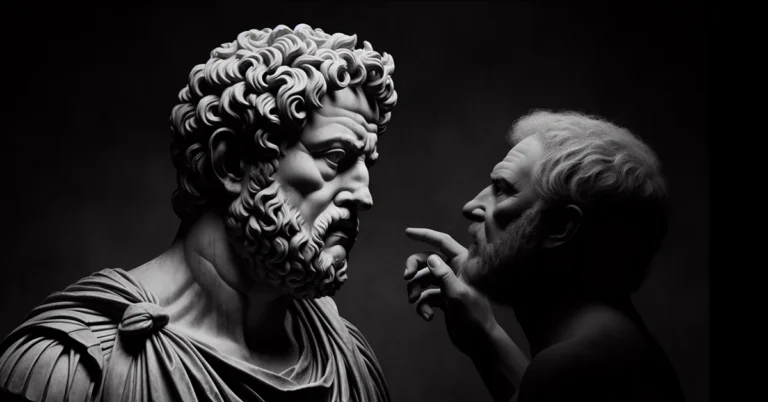The ancient Stoics’ silence isn’t just the absence of speech, it’s a powerful tool for personal growth and influence. As Zeno of Citium wisely noted, “We have two ears and one mouth, therefore we should listen twice as much as we speak.” Let’s explore how the forgotten art of Stoic silence can transform your life in ways you never imagined!
The Foundation of Stoic Silence
The philosophical origins of Stoic silence are deeply rooted in ancient wisdom. The Stoics viewed silence not just as the absence of speech, but as an active practice for developing wisdom and virtue. Zeno of Citium, who founded Stoicism around 300 BCE, established the foundational principle that humans have “two ears and one mouth” for a reason – we should listen twice as much as we speak. This wasn’t just clever wordplay; it reflected the Stoic belief that thoughtful silence was essential for learning and self-improvement.
The key distinction between passive and strategic Stoic silence is crucial for understanding this practice. Passive silence is simply not speaking – perhaps out of fear, uncertainty, or disengagement. In contrast, strategic Stoic silence is an intentional practice that serves specific purposes:
- It’s active and engaged, involving careful observation and reflection
- It’s purposeful, used to gather information and understand situations more deeply
- It’s empowering rather than submissive, demonstrating self-control and wisdom
- It’s responsive rather than reactive, allowing for thoughtful communication
Ancient Stoics used silence as a powerful tool for personal development in several ways:
- Self-reflection: They practiced daily periods of silence to examine their thoughts and actions
- Emotional regulation: They used silence to create space between stimulus and response
- Wisdom cultivation: They believed that listening and observing were crucial for developing practical wisdom
- Character building: They saw the ability to maintain silence as evidence of self-discipline and inner strength
The practice of Stoic silence remains particularly relevant today. Nowadays, where constant communication is the norm, the ability to practice strategic silence can provide a significant advantage in both personal and professional contexts. It allows us to:
- Process information more thoroughly before responding
- Develop a deeper understanding of situations and people
- Make more thoughtful and considered decisions
- Build stronger relationships through better listening
- Maintain composure in challenging situations
The Stoic approach to silence remains as powerful today as it was two millennia ago, offering a path to greater wisdom, better relationships, and more effective communication in our increasingly noisy world.
Do Stoics Suffer in Silence?
Imagine a man facing hardship—his business fails, his friends turn away, and life throws every possible obstacle in his path. Does he collapse under the weight of it all, weeping into the void? No. If he follows Stoic principles, he meets adversity with a steady gaze and an unshaken mind. But does this mean he suffers in silence? Not quite.
Seneca, one of the greatest Stoic philosophers, didn’t advocate for silent misery. He believed in resilience, but also reasoned expression. He wrote:
“We suffer more in imagination than in reality.”
Stoics don’t bottle up emotions to self-destruct later—they master them. They don’t suppress pain; they analyze it, strip it of its power, and decide how to respond. To a Stoic, suffering is just another event in life, neither good nor bad—only their reaction to it matters.
This doesn’t mean they never speak of hardship. A Stoic might confide in a trusted friend, reflect in a journal, or express their struggles in a way that cultivates wisdom. But public lamentation? Complaining for sympathy? That’s wasted energy.
Silence, for a Stoic, isn’t about suffering—it’s about control. It’s about choosing when to speak and when to let actions do the talking.
Why Is Silence the Best Answer to Anger?
Picture this: Someone insults you, challenges you, tries to get under your skin. The natural instinct? Fire back, prove a point, and defend your pride. But a Stoic? He meets anger with something far more powerful—silence.
Seneca understood the futility of reacting in rage. He warned:
“The greatest remedy for anger is delay.”
Why? Because anger is a wildfire. The more you feed it—through words, arguments, and emotional outbursts—the bigger it grows. Silence, on the other hand, is like cutting off its oxygen.
A verbal battle may feel like a victory in the moment, but what does it really achieve? More conflict, more frustration, more wasted energy. Silence, however, forces the aggressor to confront their own emotions. It shifts the power dynamic. You remain composed, they unravel.
This isn’t about weakness—it’s about control. The Stoic chooses when to speak and when to hold back, knowing that not every battle deserves engagement. Because in the end, the loudest statement is often the one left unsaid.
Are Stoic People Quiet?
If you imagine a Stoic as a silent, stone-faced figure, speaking only in cryptic nods and deep sighs, think again. Stoicism doesn’t demand silence—it demands purposeful speech. A Stoic isn’t quiet because he lacks words, but because he understands their weight.
Seneca put it best:
“It is a great thing to know the season for speech and the season for silence.”
Stoics don’t waste their breath on gossip, complaints, or meaningless chatter. Their words serve a purpose—to teach, to lead, to clarify. And when words won’t serve, silence does.
Zeno, the founder of Stoicism, famously said:
“We have two ears and one mouth, therefore we should listen twice as much as we speak.”
A Stoic listens, observes, and speaks only when necessary. This doesn’t mean they are mute—it means they understand the power of restraint. Because sometimes, the wisest thing a man can say… is nothing at all.
How Can You Tell If Someone Is Stoic?
It’s not the guy bragging about how “nothing fazes him.” It’s not the one loudly preaching Stoic wisdom to anyone who will listen. No, the real Stoic isn’t trying to prove anything—he simply is.
You’ll recognize him by his silence. Not an awkward, unsure silence, but a controlled, deliberate one. He doesn’t react to insults, doesn’t jump into pointless arguments, doesn’t fill the air with unnecessary words. As Seneca put it:
“He who is brave is free.”
Free from what? From the need to defend his ego. From the impulse to lash out. From the trap of meaningless chatter.
Marcus Aurelius also left a clue:
“You always have the option of having no opinion.”
A Stoic doesn’t have to voice every thought, debate every fool, or react to every provocation. His power lies in restraint. He observes more than he speaks, listens more than he argues, and when he does speak—his words carry weight.
So, how do you tell if someone is Stoic? Watch how they handle silence. If they master it, they likely master themselves.




